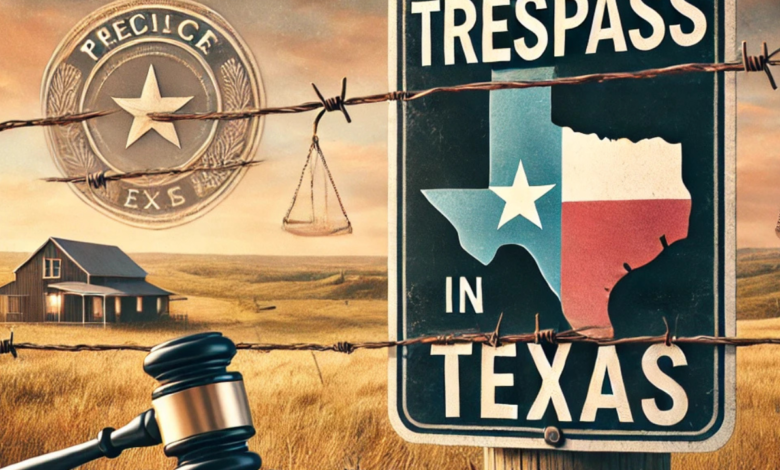criminal trespass texas

Introduction to Criminal Trespass in Texas
Criminal trespass is a legal term that describes the act of unlawfully entering or remaining on someone else’s property without consent. In Texas, this seemingly straightforward offence is governed by detailed laws that protect property owners’ rights while ensuring fairness to accused individuals. Understanding criminal trespass Texas laws is essential for anyone residing or operating within Texas, as the consequences of violating these laws can range from minor fines to severe legal penalties.
Why is understanding criminal trespass Texas laws necessary? Texas has diverse property types, from sprawling agricultural lands to urban residential areas and commercial establishments. Each property category is protected under specific provisions of the Texas Penal Code. Additionally, the penalties for criminal trespass can escalate depending on the circumstances, such as the location of the offence or whether the trespasser was armed. This guide is a comprehensive resource to help individuals navigate the complexities of criminal trespass laws in Texas, understand their rights, and avoid unintentional violations.
Legal Definition and Statutes
Under the Texas Penal Code Section 30.05, criminal trespass is defined as entering or remaining on another’s property without effective consent and with the knowledge that entry was prohibited. This knowledge can come from explicit warnings, visible signage, or fencing that indicates restricted access. The law applies to physical and verbal warnings from property owners or authorized individuals.
This statute covers different types of properties. Residential properties, commercial establishments, and even public lands can be protected by criminal trespass Texas laws. Agricultural and critical infrastructure lands, such as oil refineries or power plants, often carry heightened penalties due to their sensitive nature.
Prosecutors must establish certain elements to prove criminal trespass. These include unauthorized entry, the absence of consent from the property owner, and the trespasser’s intent to remain on the property. Distinguishing criminal trespass from burglary is also crucial. While both involve unauthorized entry, burglary generally includes the intent to commit another crime, such as theft, once inside.
Common Scenarios and Examples
Criminal trespass Texas laws can apply in a variety of situations. One of the most common scenarios involves trespassing on private property. For example, entering a neighbour’s yard without permission or accessing a gated community without proper authorization can lead to criminal trespass charges.
Another frequent occurrence is entering commercial establishments after being explicitly barred. Suppose someone is removed from a store for disorderly behaviour and returns despite being told not to—this could result in criminal trespass charges. Similarly, agricultural trespass is a significant issue in rural Texas. Unauthorized entry into fenced fields, whether for recreational activities like hunting or simply out of curiosity, can lead to severe legal consequences.
Public property violations also fall under the purview of criminal trespass Texas laws. While public parks and government buildings are generally accessible, certain areas may have restricted access. Ignoring these restrictions can result in charges. Lastly, misunderstandings or accidental trespasses are also common. For instance, hikers who unintentionally wander onto private property due to unclear boundary markings may face legal repercussions.
Penalties and Legal Consequences
The penalties for criminal trespass in Texas laws vary depending on the nature of the offence. Typically, trespass is classified as a misdemeanour, but the severity of the charge depends on specific circumstances. A Class C misdemeanour, the lowest level, usually applies to minor offences, such as entering an open property without malicious intent. Penalties for Class C misdemeanours may include fines of up to $500.

Class B misdemeanours are more serious and apply to cases where the trespass involves buildings, residential areas, or properties with posted restrictions. Convictions can result in up to 180 days in jail and fines of up to $2,000.The charge may escalate to a Class A misdemeanour charge may escalate to a Class A misdemeanour in more severe cases, such as trespassing on critical infrastructure or agricultural lands with a firearm. This can carry penalties of up to one year in jail and fines reaching $4,000.
Beyond fines and jail time, individuals convicted of criminal trespass in Texas laws face additional consequences. A criminal record can impact future job opportunities, housing applications, and social relationships. In some cases, property owners may also pursue civil lawsuits for damages resulting from the trespass.
Defences Against Criminal Trespass Charges
Several defences may help mitigate or dismiss the charges if you are accused of criminal trespass. One common defence is the lack of intent. For example, if the trespass occurred due to confusion about property boundaries, this could be used to challenge the prosecution’s case. Similarly, if the accused had prior consent from the property owner but was unaware that it had been revoked, this could serve as a viable defence.
Another critical defence involves public access exceptions. If the area in question was accessible to the public and lacked proper signage or warnings, the accused may argue that they could not know their presence was unauthorized. Trespass charges arising from misunderstandings can often be resolved through negotiation or mediation, mainly if no harm or damages were caused.
Hiring an experienced attorney is vital when facing criminal trespass Texas charges. Legal professionals can analyze the specifics of your case, gather evidence, and present a strong defence to achieve the best possible outcome.
Preventing Criminal Trespass
Preventing criminal trespass requires proactive measures from both property owners and individuals. For property owners, marking boundaries is essential. Installing fences, barriers, or visible “No Trespassing” signs can deter unauthorized entry and strengthen legal standing in the event of a violation.
Individuals can avoid trespass charges by remaining vigilant about property boundaries and seeking permission before entering unfamiliar areas. Recognizing and respecting legal notices, such as verbal warnings or posted signage, is also crucial. When in doubt, it’s better to err on caution and avoid entering restricted areas.
Education plays a vital role in prevention. By understanding criminal trespass Texas laws and their implications, individuals can make informed decisions and avoid situations that could lead to accusations.
Conclusion
Criminal trespass Texas laws protect property owners while ensuring individuals clearly understand their rights and responsibilities. Whether you are a property owner or a visitor, knowing the rules can help you avoid legal complications and maintain positive relationships with others. By staying informed and respecting boundaries, you can confidently navigate Texas’ property laws.
FAQs
- What is considered a warning for criminal trespassing in Texas?
- A warning can be verbal, written, or indicated by signage or fencing that marks restricted areas.
- How does Texas law treat accidental trespassing?
- Accidental trespass can still result in charges, but intent and lack of knowledge may be used as defences.
- Can you be charged with trespass if you leave immediately upon being asked?
- Leaving immediately may mitigate charges, but the initial unauthorized entry could still lead to legal action.
- Are there specific trespass laws for hunting or fishing in Texas?
- Yes, entering private land for hunting or fishing without permission is considered trespassing and may carry heightened penalties.
- What should I do if I’m falsely accused of trespass?
- Consult with an attorney to gather evidence and build a defence. Misunderstandings can often be resolved through legal processes.
- Do “No Trespassing” signs need to meet specific requirements in Texas?
- Yes, signs should be visible and meet state standards, such as being placed at regular intervals.
- Can minors be charged with Criminal Trespass in Texas?
- Minors can be charged, but cases may be handled differently, often focusing on rehabilitation rather than punishment.
You May Also Read: https://bestusatime.com/angelie-grace-dye/



